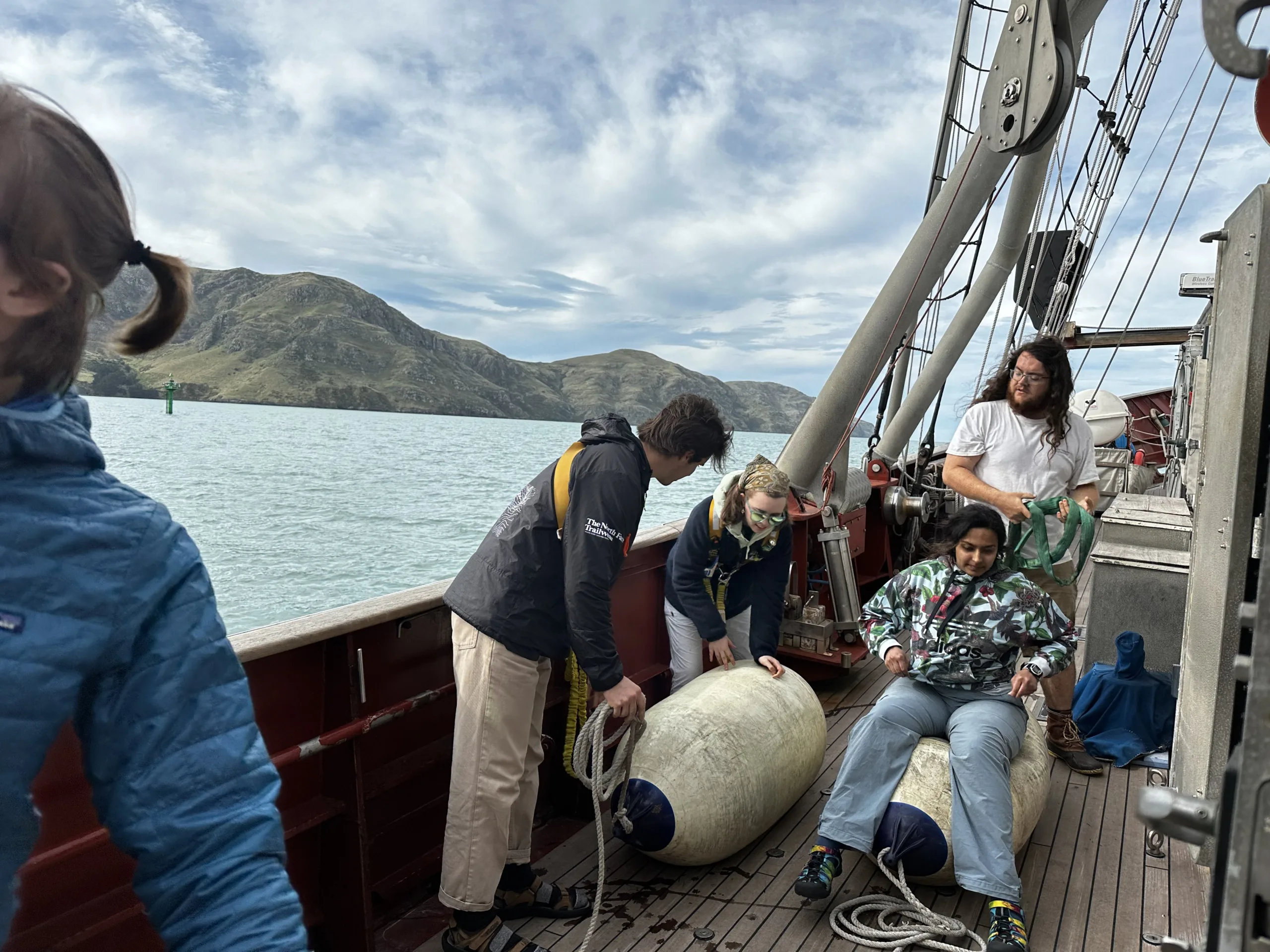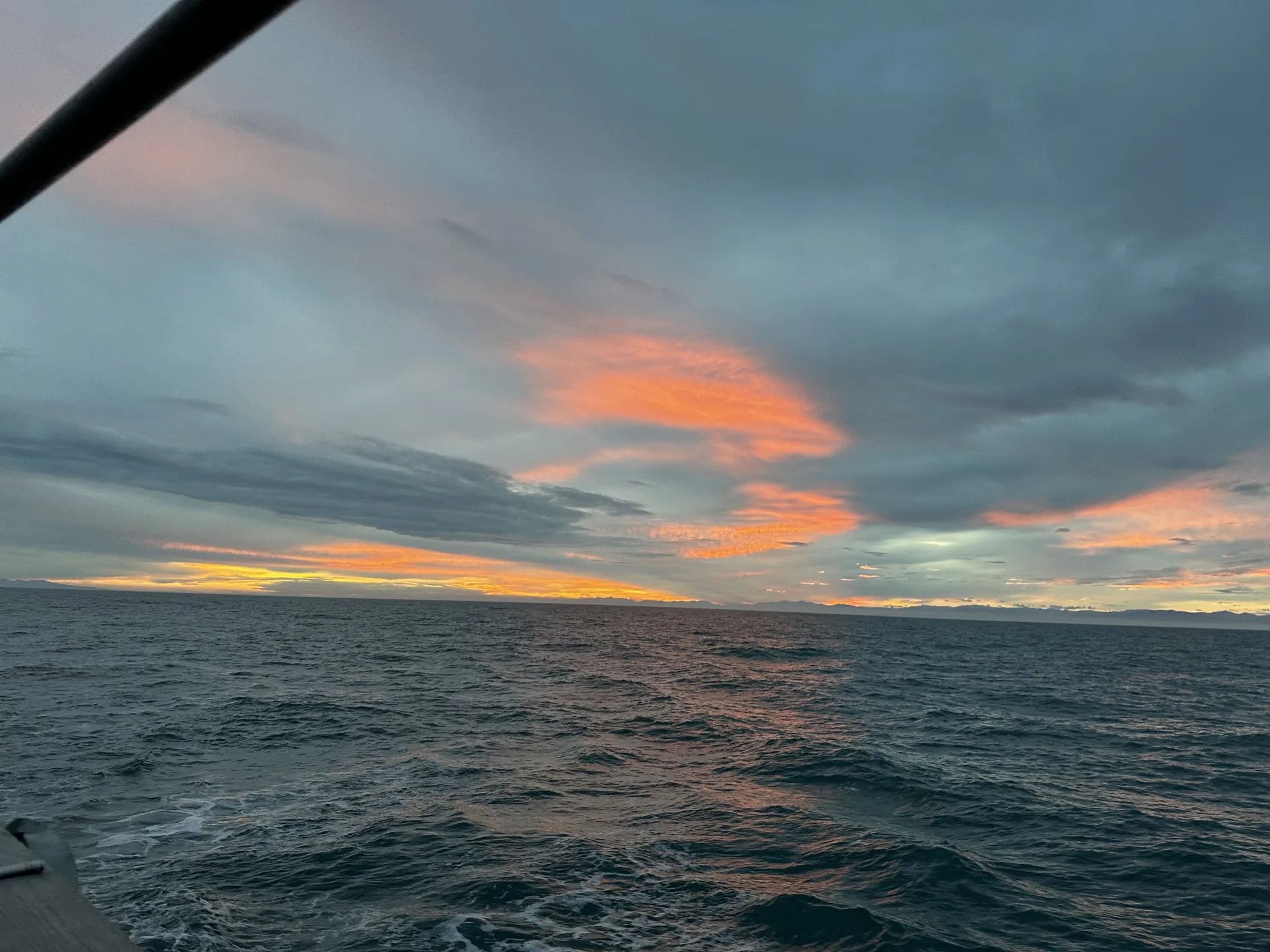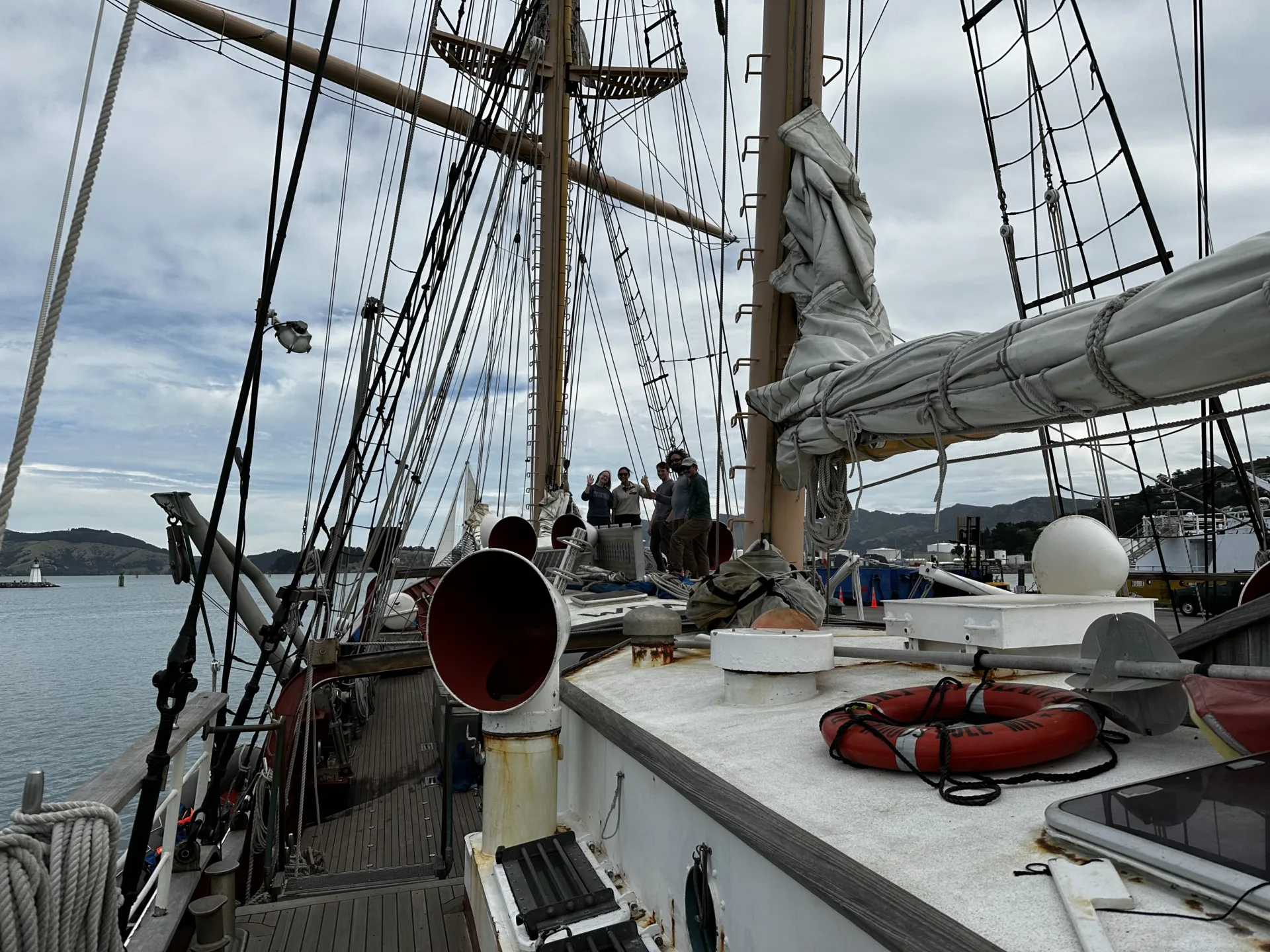Programs Blog
Ch-ch-ch-ch-changes, Face the Strange

Date: April 7, 2025
Time: 1510
Location: 41°44.8’ S x 174°49.1’E – crossing Cook’s Straight
Weather: Wind out of the NNW, Beaufort force 6, 5ft seas out of the NNW
Something I’ve come to believe through the years is that one of the only constant things on this silly little planet of ours is change. In my time working on the ocean and on boats, I have found that this is more obvious out here on the water than it is anywhere else. It’s one of the things I love so much about being out at sea. The ocean itself is constantly in motion, shifting currents and waves are always changing its, and therefore our, position in space continuously. Not only is the boat moving from the motion of the ocean but we also actively propel ourselves forward through latitudes and longitudes – moving ourselves over depths we can’t fully fathom (literally too – a fathom is a unit of measurement used for water depth). Not only is there this changing of the water but there are rapidly shifting weather patterns and cloud formations. At each watch turnover there are exchanges of information and a changing of the people responsible for the boat and our safety. All of these changes bombard us on our floating home out here in the South Pacific to make us all at least a little uncomfortable. Whether it’s from a lack of sleep thanks to the shifting watch schedules interrupting our REM cycles, some queasy-ness or the bumbling and fumbling around that comes with that aforementioned motion of the ocean.
As the program assistant, (Grace, here!) I have had the delight and pleasure to work with these students during their shore component in Woods Hole. I’ve gotten to see them concoct delicious and copious amounts of soup, explore Woods Hole and the greater Cape, learn about Nautical Science, Oceanography, Ocean Policy, and Environmental Communications, and create their own special brand of community. It’s been a program chock full of transitions already and boy does that not end here. With the students moving onto the Robert C Seamans, a lot of change comes with that; for them, the staff, and the boat. Our community grows in numbers and in distance with our journey beginning off into the Pacific! For science! This most recent and most obvious change can be one of a lot of discomfort, there’s a pretty big adjustment period and most people are on seasickness medications for at least the first three days or whenever we run into bigger sea states. You (and a few of our seasick students) might be asking, ‘Why on earth does anyone choose to do this?’ I might say to you, well, there are a lot of reasons, but it feels nearly impossible, or at least very difficult to explain them all. One recent and obvious reason is that we’ve been already seeing a lot of wildlife on our voyage, including unidentified dolphins, albatrosses, and seals playing in the waves.
Not only are there beautiful sights to be seen and creatures to meet, but there is also extreme value in trying to find peace, humor (I for one get a good giggle in every time I see someone walk a little bit sideways in order to account for the ship’s heal) and comfort in the discomfort and change that comes with life onboard, and life everywhere. You gain a strong sense of potential in yourself as you see yourself take on and persevere through challenging conditions, and comradery with the other people onboard as you learn to laugh about noodling around as you walk or the fact that you’re awake at 1:00 AM for a kind of work meeting. This is something that much of the professional crew onboard has become proficient in. Setting sail yesterday felt pretty surreal; there had been so much talk and buildup onshore that it almost became this unreal-going-to-happen-maybe-someday thing. The fact that the day actually came? Wild.
While each trip comes with new experiences and delights, this is a completely new experience for students, who comprise half of our ship’s company. There had been a lot of nerves and jitters of excitement throughout the shore component, the students didn’t know what to expect and the explanations staff do our best to give never fully hit home. Each explanation comes with a heap of background information due to the environment we exist in; it almost feels like another little world, unique and precious within our greater globe.
As we finally got off the dock yesterday (WOOHOO) there is still a consistent and obvious unknowing about what is coming our way. There is much that we do onboard here in order to make sure that these uncertainties are within a realm of safety and comfort that the professional crew feels confident dealing with. This includes but does not limit ourselves to course changes to avoid weather, making sure everyone has a hand on the boat when walking around in tricky sea states, having hourly boat checks to make sure that all is well in all spaces onboard, having strict and specific rules for line handling, and having a medical officer (it’s me!) on board who is responsible for the medical care of the ship’s company. We have a stockpile of medical supplies and medications onboard as well as access to a doctor on call if we need a second opinion. Everyone onboard is responsible for the well-being of themselves, each other, and the boat. Each of these pieces is reliant on the other; in order for us to function as a unit, we must all take care of ourselves so that we can therefore take care of each other, and then in turn, take care of the ship who takes care of us, houses and protects us, in this environment that we came from–but have adapted to exist outside of–in our history as a species.
One of my favorite parts about being the Program Assistant for this program has been seeing the changes that happen in our students as they became more comfortable in Woods Hole and in the community that they built for themselves. One other certainty, alongside change, is the magic that happens out here on our little floating home, far from land, and I can’t wait for them to experience it. As we continue, people will become more settled into the routine, things that in these first few days feel absurd and out of this world will become mundane (I mean, maybe not mundane, but at least a little more normal) and then there will be this same adjustment to a foreign way of life when we return to land. Have you ever heard of land sickness? It’s a thing! The equilibrium that has become so used to the rocking motion that comes from being on a boat has to then readjust to being on land – not everyone gets it, but it happens, if only to represent these very real but unseeable changes that happen to us while we’re at sea. Luckily we don’t need to think about land sickness quite yet, we’re still at the beginning of our grand adventure.
A big shout-out and hug to Elle, she unfortunately had to depart the ship’s company before we left Lyttelton due to a knee injury. The decision was not an easy one but the lack of medical care for the next 4-5 weeks and the danger of moving around a moving vessel with a bad knee made it the safe choice. We’re already feeling the stumbling here onboard as we skirt around a low pressure system. We miss you and are sending you love, Elle! Hope you heal up soon and we’ll see you in Moore’a!
Fair winds and following seas,
Grace


Recent Posts from the Ships
- Ocean Classroom 2024-A collaborative high school program with Proctor Academy
- Collaborations and Long-term Commitments: SEA’s Caribbean Reef Program Sets a Course for Coastal Programs that Compliment Shipboard Experiences.
- Sea Education Association students prepare for life underway using state of the art nautical simulation from Wartsila Corporation.
- SEA Writer 2022, Magazines From the Summer SEA Quest Students
- Technology@SEA: Upgrades Allow Insight into Ocean Depths
Programs
- Gap Year
- Ocean Exploration
- High School
- Science at SEA
- SEA Expedition
- SEAScape
- Pre-College
- Proctor Ocean Classroom
- Protecting the Phoenix Islands
- SPICE
- Stanford@SEA
- Undergraduate
- Climate and Society
- Climate Change and Coastal Resilience
- Coral Reef Conservation
- Marine Biodiversity and Conservation
- MBL
- Ocean Exploration: Plastics
- Ocean Policy: Marine Protected Areas
- Oceans and Climate
- Pacific Reef Expedition
- The Global Ocean: Hawai'i
- The Global Ocean: New Zealand